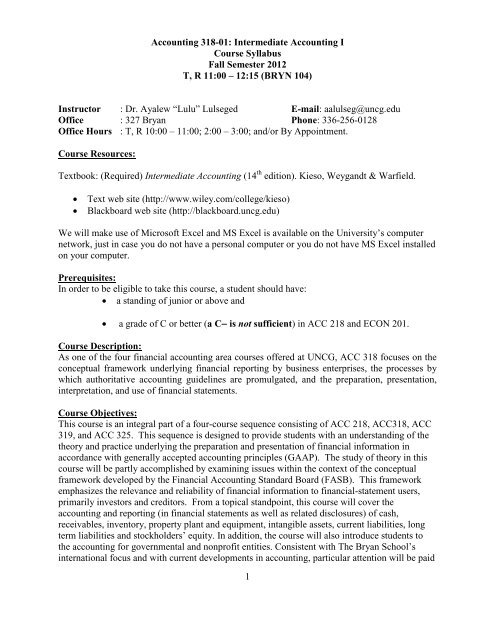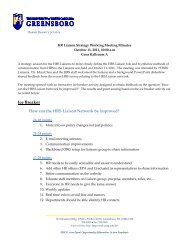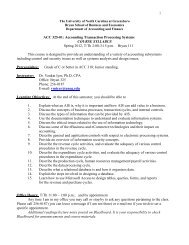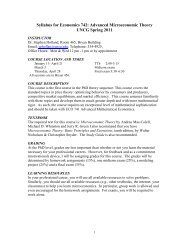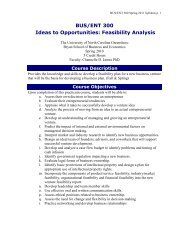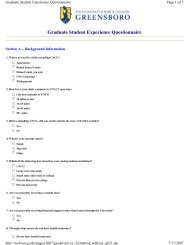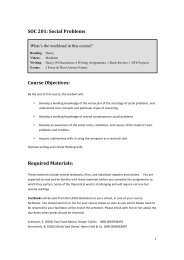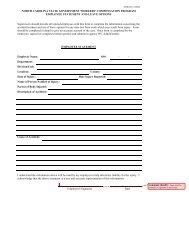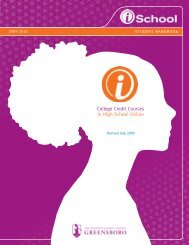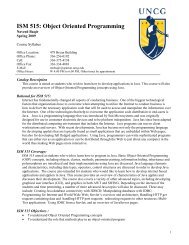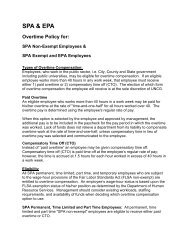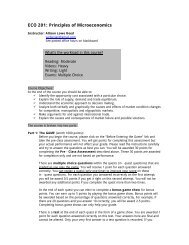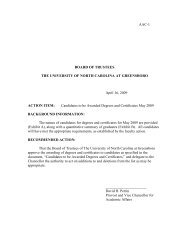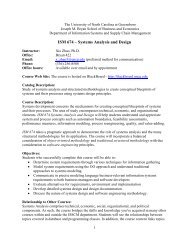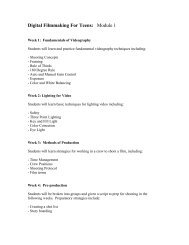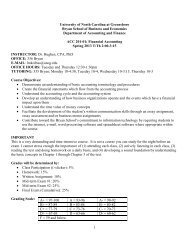1 Accounting 318-01: Intermediate Accounting I Course Syllabus ...
1 Accounting 318-01: Intermediate Accounting I Course Syllabus ...
1 Accounting 318-01: Intermediate Accounting I Course Syllabus ...
You also want an ePaper? Increase the reach of your titles
YUMPU automatically turns print PDFs into web optimized ePapers that Google loves.
<strong>Accounting</strong> <strong>318</strong>-<strong>01</strong>: <strong>Intermediate</strong> <strong>Accounting</strong> I<br />
<strong>Course</strong> <strong>Syllabus</strong><br />
Fall Semester 2<strong>01</strong>2<br />
T, R 11:00 – 12:15 (BRYN 104)<br />
Instructor : Dr. Ayalew “Lulu” Lulseged E-mail: aalulseg@uncg.edu<br />
Office : 327 Bryan Phone: 336-256-<strong>01</strong>28<br />
Office Hours : T, R 10:00 – 11:00; 2:00 – 3:00; and/or By Appointment.<br />
<strong>Course</strong> Resources:<br />
Textbook: (Required) <strong>Intermediate</strong> <strong>Accounting</strong> (14 th edition). Kieso, Weygandt & Warfield.<br />
• Text web site (http://www.wiley.com/college/kieso)<br />
• Blackboard web site (http://blackboard.uncg.edu)<br />
We will make use of Microsoft Excel and MS Excel is available on the University’s computer<br />
network, just in case you do not have a personal computer or you do not have MS Excel installed<br />
on your computer.<br />
Prerequisites:<br />
In order to be eligible to take this course, a student should have:<br />
• a standing of junior or above and<br />
• a grade of C or better (a C− is not sufficient) in ACC 218 and ECON 2<strong>01</strong>.<br />
<strong>Course</strong> Description:<br />
As one of the four financial accounting area courses offered at UNCG, ACC <strong>318</strong> focuses on the<br />
conceptual framework underlying financial reporting by business enterprises, the processes by<br />
which authoritative accounting guidelines are promulgated, and the preparation, presentation,<br />
interpretation, and use of financial statements.<br />
<strong>Course</strong> Objectives:<br />
This course is an integral part of a four-course sequence consisting of ACC 218, ACC<strong>318</strong>, ACC<br />
319, and ACC 325. This sequence is designed to provide students with an understanding of the<br />
theory and practice underlying the preparation and presentation of financial information in<br />
accordance with generally accepted accounting principles (GAAP). The study of theory in this<br />
course will be partly accomplished by examining issues within the context of the conceptual<br />
framework developed by the Financial <strong>Accounting</strong> Standard Board (FASB). This framework<br />
emphasizes the relevance and reliability of financial information to financial-statement users,<br />
primarily investors and creditors. From a topical standpoint, this course will cover the<br />
accounting and reporting (in financial statements as well as related disclosures) of cash,<br />
receivables, inventory, property plant and equipment, intangible assets, current liabilities, long<br />
term liabilities and stockholders’ equity. In addition, the course will also introduce students to<br />
the accounting for governmental and nonprofit entities. Consistent with The Bryan School’s<br />
international focus and with current developments in accounting, particular attention will be paid<br />
1
to International <strong>Accounting</strong> theory and practices. This will be mainly accomplished by the<br />
introduction of IFRS at the same time similar material involving U.S. theory and practices is<br />
presented. Lastly, experience will be obtained in the use of MS Excel.<br />
<strong>Course</strong> Philosophy:<br />
Mastery of the material covered in this course is essential for professional accountants,<br />
regardless of specialization. As future accounting professionals, you must be prepared for a<br />
significantly more challenging and complex environment than ever before. It is no longer<br />
sufficient to obtain narrow technical training largely based on the memorization of existing rules<br />
and regulations. It is important that you acquire a thorough comprehension of the principles that<br />
govern financial accounting and reporting and that you are able to apply these principles to<br />
existing problems as well as to emerging issues. You also need to be aware of the ethical and<br />
international aspects of accounting and must be able to communicate information clearly and<br />
concisely.<br />
Grading:<br />
<strong>Course</strong> grades will be calculated as shown below.<br />
The grading scale is as follows:<br />
Midterm Exam 1 25%<br />
Midterm Exam 2 25%<br />
Final Exam (Comprehensive) 35%<br />
Homework 15%<br />
Total 100%<br />
A+ 97% and above<br />
A 93 – 96.99%<br />
A- 90 – 92.99%<br />
B+ 87 – 89.99%<br />
B 83 – 86.99%<br />
B- 80 – 82.99%<br />
C+ 77 – 79.99%<br />
C 73 – 76.99%<br />
C- 70 – 72.99%<br />
D+ 67 – 69.99%<br />
D 63 – 66.99%<br />
D- 60 – 62.99%<br />
F < 60%<br />
Note that an accounting major requires a grade of at least a C to take further courses in<br />
accounting.<br />
2
Exams<br />
Two midterm exams and a final exam will be administered in this course. The exams will<br />
consist of objective questions (e.g., multiple choice), subjective questions (e.g., short answer),<br />
and/or problems. The midterm exams will be administered during class time on the dates<br />
indicated in the course schedule. Failure to attend class on the date of an exam will result in a<br />
grade of zero unless: (a) I am notified in advance, (b) the reason for missing the exam is valid,<br />
and (c) acceptable documentation of the reason can be provided. If all three of these conditions<br />
are satisfied, a makeup exam will be administered at the earliest possible date following the<br />
scheduled exam. While efforts will be made to construct a makeup exam which is similar in<br />
difficulty to the original exam, any deviation in difficulty level may result in a more difficult<br />
makeup exam.<br />
Homework Assignments<br />
(1) A series of end of chapter exercises and problems, indicated on the tentative course<br />
schedule in the syllabus, will be collected on the class meeting day immediately after<br />
THE DATE we finish a CHAPTER. For example, if we finish the discussion of chapter 7<br />
on a Tuesday, chapter 7 homework will be due on Thursday (the next class meeting date).<br />
While assignments will be accepted early, under no circumstances will assignments be<br />
accepted late. Problems will be graded based on your effort. However, that does not<br />
mean that incomplete efforts or partial efforts will receive full credit. The lowest two<br />
homework grades will be dropped in calculating your final homework grade.<br />
(2) As the end of each chapter, you will be asked to read the financial statements as well as<br />
the notes to the financial statements of a real life company and (a) answer questions<br />
related to the accounting and reporting practice of the company; (b) compute financial<br />
ratios and analyze/assess the financial performance and financial conditions of the firm.<br />
The due dates for these assignments will be announced in class and on blackboard.<br />
Suggested Exercises and Problems<br />
Timely completion of and performance in the assigned homework problems is critical to success<br />
in this course. It is important that you attempt the homework without the benefit of reference to<br />
the text or your notes or the power point slides in order to make sure that you have truly<br />
understood the materials covered.<br />
Other Grading Information<br />
Attendance in a critical course in your major area of study is vital. You are expected to manage<br />
your personal and professional schedule in a responsible manner so as to minimize scheduling<br />
conflicts. Excessive absences can and will result in indirect grade reductions.<br />
3
Academic Integrity Policy:<br />
Each student is expected to complete all requirements of this course in all respects in conformity<br />
with UNCG’s Academic Integrity Policy. The paragraph below, which was taken from this<br />
Policy, highlights students’ responsibilities regarding academic integrity.<br />
Students should recognize their responsibility to uphold the Academic Integrity Policy<br />
and to report apparent violations to the appropriate persons. Students who do not understand<br />
the policy or its application to a particular assignment are responsible for raising such questions<br />
with their faculty member.<br />
For complete information on the policy, please read the Bryan School Faculty and Student<br />
Guidelines at http://www.uncg.edu/bae/faculty_student_guidelines.pdf<br />
<strong>Course</strong> Expectations<br />
• A solid understanding of the concepts, methods, and terminology covered in ACC 218, or courses<br />
equivalent to it, is critical to the mastery of the concepts covered in this course. It is assumed that<br />
students are proficient with the basic mechanics of accounting: journalizing transactions<br />
in good form, posting entries to the general ledger, preparing the trial balance, etc. It is<br />
also assumed that students are familiar with the preparation of the primary financial<br />
statements. If you are not comfortable with your skills in this area, you are well advised<br />
to spend some time consulting your textbook and/or notes from ACC 218 to bring<br />
yourself up to speed.<br />
• <strong>Accounting</strong> <strong>318</strong> is a rigorous and time-consuming course. It requires in-depth study and<br />
analysis and should not be undertaken casually. Here are some steps you may take to avoid<br />
the common "I understand the material, but I just can't do it on the exam" syndrome:<br />
1. Do not take this course in conjunction with a full class load, full-time work and<br />
an extensive social life. One or more of these commitments will have to go. This<br />
course will require a substantial amount of time. You should plan to attend<br />
every class meeting prepared (having read and worked assigned problems<br />
ahead of time!)<br />
2. Avoid too many similarly demanding courses.<br />
3. Stay up-to-date in all assignments.<br />
4. Consult me BEFORE YOU ARE HAVING SERIOUS DIFFICULTIES!<br />
Other Items:<br />
• TURN CELL PHONES OFF BEFORE CLASS AND EXAMS!<br />
• IF YOUR CELL PHONE GOES OFF DURING AN EXAM YOUR PAPER WILL<br />
BE COLLECTED AT THAT POINT AND YOU WILL NOT BE ALLOWED<br />
ADDITIONAL TIME TO COMPLETE YOUR EXAM.<br />
• There are no opportunities for “extra credit” in this course. Exams may not be reworked<br />
for additional points after they have been graded and returned. The homework<br />
assignments may not be reworked or revised, for the purpose of raising the assigned<br />
grade, after they have been graded. No additional work may be performed, for the<br />
purpose of improving the assigned semester grade, after semester grades have been<br />
assigned.<br />
4
Students with Disabilities:<br />
If you have a documented disability for which you need special arrangements, please contact the<br />
Student Disability Services Office: http://ods.dept.uncg.edu/services. Any requests for special<br />
accommodations must come through that office with the appropriate paperwork.<br />
Adverse Weather:<br />
The University of North Carolina at Greensboro will remain open during adverse weather<br />
conditions unless an administrative decision on changing work and class schedules is made by<br />
the Chancellor. Students can receive details on the UNCG home page (www.uncg.edu), or by<br />
dialing three campus telephone numbers: Adverse Weather Line (336-334-4400); Campus<br />
Switchboard (336-334-5000); and University Police (336-334-5963).<br />
Important Dates<br />
August 24, Friday<br />
September 3, Monday<br />
October 12, Friday<br />
Last day to change courses or course sections without<br />
special permission; last day to drop course for tuition and<br />
fees refund.<br />
Labor Day Holiday.<br />
Last day to drop courses without academic penalty.<br />
Tentative <strong>Course</strong> Schedule:<br />
The Tentative <strong>Course</strong> Schedule is attached. It is intended as a general guide and is subject to<br />
change based upon the developments in class. Modifications and updates will be announced in<br />
class and a revised <strong>Course</strong> Schedule will be available on Blackboard. The Topic Summary is not<br />
intended as an exhaustive list of the topics that will either be covered in class or for which the<br />
student is responsible. It is only to serve as a guide to the range of material to be covered in that<br />
particular class session. Unless otherwise indicated, students are responsible for all the materials<br />
covered in the chapters listed in the course schedule below.<br />
5
TENTATIVE COURSE SCHEDULE<br />
DATE TOPIC SUMMARY CH. EXERCISES & PROBLEMS<br />
08/21 <strong>Course</strong> Introduction and 7<br />
exercise<br />
08/23 Recognition and valuation<br />
of Accounts Receivables<br />
7<br />
08/28 Recognition and Valuation<br />
of Notes Receivables<br />
7<br />
08/30 Receivable Financing 7<br />
09/04 Cash<br />
7 & E7-1, 5, 8, 9, 13, 15, 18, 23, 24<br />
- Definitions<br />
- Reconciliations<br />
Ap.<br />
09/06 Inventories<br />
8<br />
- Definitions<br />
09/11 Inventories<br />
8<br />
- Cost Flow<br />
09/13 Inventories<br />
- $ Value LIFO<br />
8 E8-1, 5, 6, 8, 11, 13, 16, 25, 26.<br />
P8-6<br />
09/18 Inventories<br />
9<br />
- LCM<br />
09/20 Inventories<br />
- Other Valuation<br />
Methods<br />
09/25 PP&E<br />
- Acquisitions<br />
09/27 PP&E<br />
- Cap. Interest<br />
10/02 EXAM<br />
Chs. 7 - 9<br />
10/04 PP&E<br />
- Costs subsequent to<br />
acquisition<br />
9 E9-3, 4, 10, 13, 17,<br />
P9-1, 6<br />
10<br />
10<br />
10 E10-2, 3, 5, 7, 8, 9, 13, 14, 18, 19, 20, 23, P10-9<br />
10/09 Depreciation 11<br />
10/11 Impairment & Depletion 11 E11-1 ,3, 4, 6, 11, 18, 21, 22<br />
10/16 Fall Break NO CLASS<br />
6
DATE TOPIC SUMMARY CH. EXERCISES AND PROBLEMS<br />
10/18 Intangible Assets<br />
12<br />
- Definitions<br />
10/20 Intangible Assets<br />
12 E12-1, 2, 3, 6, 9, 10, 13, 14, 16<br />
- Amortization<br />
- Impairment<br />
- Research &<br />
Development<br />
10/25 Current Liabilities 13<br />
- Types<br />
- Employee Related<br />
- Contingencies<br />
10/30 Current Liabilities 13 E13-1, 7, 8, 10, 12, 13,<br />
- Warranties<br />
P13-7<br />
- Premiums<br />
- Coupons<br />
11/<strong>01</strong> Bonds-Definitions 14<br />
Issuance<br />
11/06 EXAM 2<br />
Chapters 10 – 12<br />
11/08 Bonds-Issuance<br />
14<br />
Effective Interest<br />
11/13 Bonds-Misc.<br />
Notes Payable<br />
14 E14-2, 3, 5, 11, 16,<br />
P14-2<br />
11/15 Equity-Definitions 15<br />
Stock Issuance<br />
11/20 Treasury Stock<br />
Preferred Stock<br />
Dividends<br />
15 E15-2, 5 ,6, 13,<br />
P15-5, 6<br />
11/22 NO CLASS THANKSGIVING HOLIDAY<br />
11/27 NFP <strong>Accounting</strong> HANDOUT<br />
11/29 GOVT <strong>Accounting</strong> HANDOUT<br />
12/11 FINAL EXAM<br />
Comprehensive<br />
12:00 – 3:00pm<br />
7


